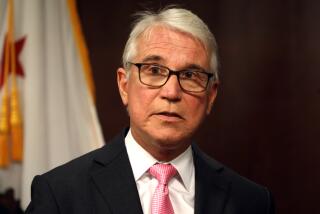State Probing Claim of PC Defects
- Share via
The state attorney general’s office is investigating a whistle-blower’s claim that IBM Corp., Toshiba Corp. and other computer makers hid a defect in personal computers sold to local governments, people familiar with the case said.
The probe was prompted by a whistle-blower lawsuit by former IBM engineer Phillip Adams. The companies are accused of concealing a problem in floppy disk controllers that can corrupt data, the people said.
Toshiba on Monday won a federal judge’s approval of a $2.1-billion settlement that ends a Texas class action over the same alleged defect. Adams--described by his attorneys as the person who discovered the problem--helped the plaintiffs in the Texas case.
“What gives the suit credibility is the fact that he was a consultant in a case resulting in Toshiba’s $2.1-billion settlement,” said Eric Havian, a former federal prosecutor who specializes in whistle-blower cases.
Adams’ suit is broader than the Texas case. His suit targets component makers, distributors, retailers and the world’s leading software maker, Microsoft Corp. It was filed in San Francisco County Superior Court.
Adams’ attorneys didn’t return calls seeking comment.
About 500 cities, counties and other public agencies in California have opted out of the Texas settlement, according to California Atty. Gen. Bill Lockyer’s office. That preserves their right to join Adams’ case or pursue other legal action against Toshiba.
People who have seen Adams’ suit, which has been placed under seal while the state decides whether to take control of the case, say it names more than two dozen companies. Those firms are alleged to have either sold or leased defective computer components or PCs, or software and devices that contain or support the defect.
Under California’s False Claims Act, the attorney general is required to evaluate every claim filed by a whistle-blower. Before intervening and taking responsibility for a case, the state must confirm that false claims were made, and that people from within the companies knew or should have known false claims were being made. Such investigations can take years.
Senior Assistant Atty. Gen. Chris Ames, who supervises the state’s false claims unit, declined to comment on the existence of an investigation. The attorney general’s office in December sent state agencies a confidential letter indicating it was investigating Adams’ claim, according to one person who has seen the letter. A second person familiar with the case confirmed that the office is investigating the claim.
Adams’ lawyers say the alleged defect found in notebook and desktop PCs can have “catastrophic” results. It could corrupt such data as that which is used to administer radiation doses to cancer patients at state or county hospitals and engineering data used to build dams or bridges, they say.
Lockyer’s office declined to comment on whether any public entities have reported losing any data because of the defect. Toshiba said it has not received any customer complaints about lost data.
The defendants in Adams’ suit include at least 10 computer and component makers: IBM, Intel, Gateway Inc., Hewlett-Packard, Iomega Corp., NEC Corp., Samsung Electronics, Toshiba, Unisys Corp. and Winbond Electronics Corp.; two distributors, Ingram Micro Inc. and Tech Data Corp.; and one software company, Microsoft.
Seven retailers were named: Circuit City Stores Inc.; CompUSA Inc.; Costco Wholesale Corp.; Office Depot Inc.; Sears, Roebuck & Co.; Staples Inc.; and Wal-Mart Stores Inc.
With the exception of one company, the defendants either said they were unaware of Adams’ suit and the investigation, or declined to comment.






